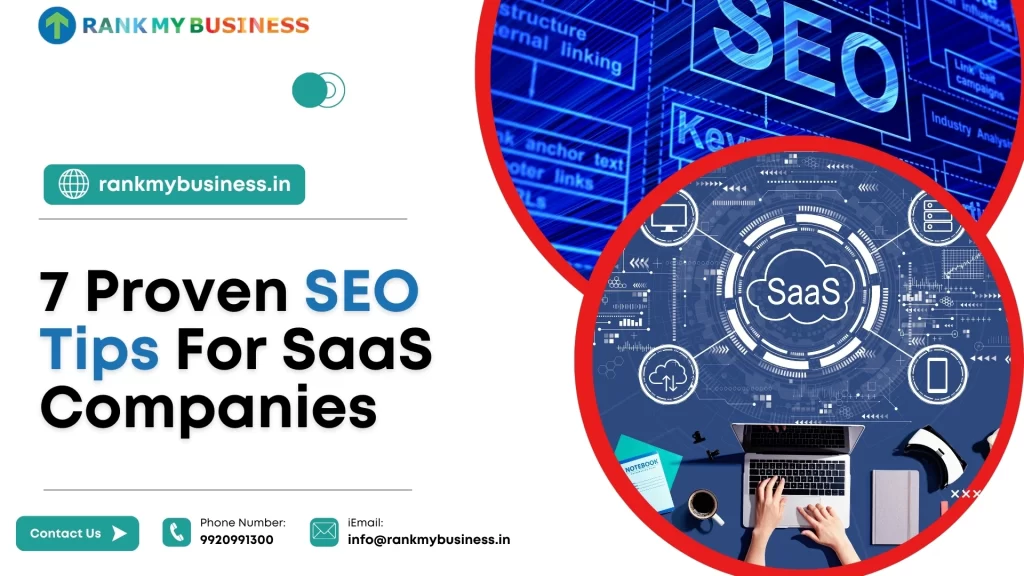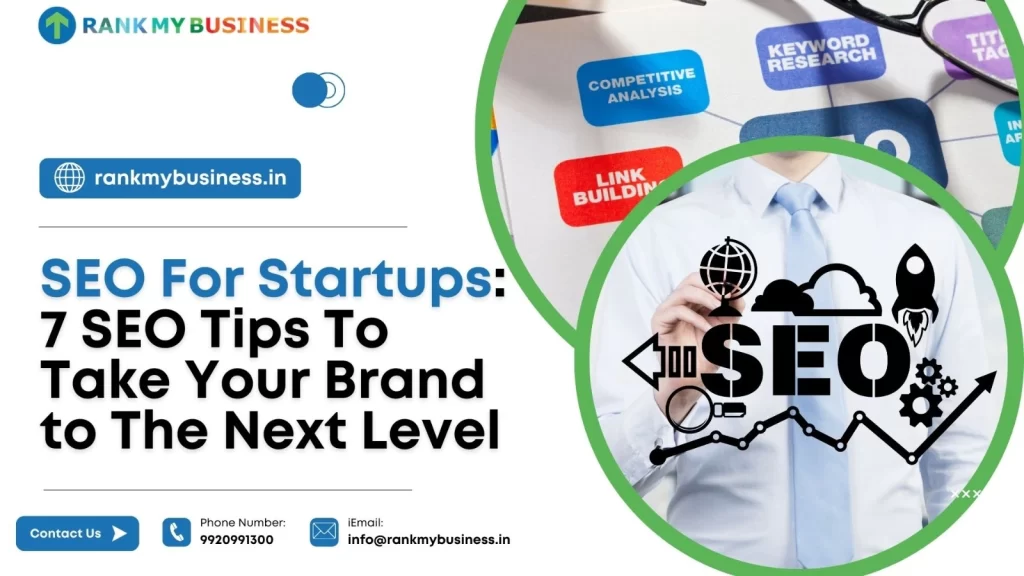7 Proven SEO Tips For SaaS Companies

In the SaaS world, SEO is a powerful tool for driving organic traffic, building brand authority, and, ultimately, converting leads into long-term customers. SEO for SaaS companies is uniquely challenging due to complex buyer journeys, high competition, and a heavy emphasis on value-driven content. In this article, we’ll uncover seven proven SEO tips tailored for SaaS businesses to help them boost online visibility and engage potential customers at each stage of their journey. What is SaaS SEO? SaaS SEO involves search engine optimization strategies specifically tailored for Software-as-a-Service (SaaS) companies. Unlike e-commerce SEO, which often focuses on direct product searches, SaaS SEO has a broader goal: attracting potential customers by addressing their pain points and educating them about solutions. SaaS businesses often face a long and complex sales cycle. SEO needs to cater to users at different stages, from awareness to decision-making, with each stage requiring different types of content and keywords. Understanding the SaaS Buyer Journey In SaaS, understanding the buyer journey is crucial for developing effective SEO services. This journey typically includes three main stages: Awareness: The user is aware of their problem but is just starting to explore solutions. Consideration: The user knows various solutions and is comparing options, including your SaaS. Decision: The user is ready to make a purchase decision and needs reassurance about your product. Knowing these stages helps you craft content that guides potential customers smoothly through the funnel. 1: Focus on Relevant Keywords for Every Stage of the Funnel To maximize the effectiveness of your SEO, target different keywords for each stage: Top of the Funnel (TOFU): Focus on educational keywords, such as “how to [problem],” to attract awareness-stage users. Middle of the Funnel (MOFU): Use comparative keywords like “best [solution] software” or “alternatives to [competitor].” Bottom of the Funnel (BOFU): Prioritize high-intent keywords like “buy [your product]” or “[your product] pricing.” This approach ensures your SEO efforts align with your users’ search intent, increasing the likelihood of conversions. 2: Optimize Content for Educational and Value-Based Content Marketing SaaS users often need in-depth information before making a decision. By creating educational content, you can establish authority and trust. Consider these content types: Blogs: Regularly publish articles on industry trends and relevant topics. eBooks and Whitepapers: Offer in-depth guides that your audience can download. Case Studies: Show how your product has helped other clients achieve success. Educational content can answer potential customer questions while subtly highlighting your SaaS solution. 3: Build an Effective Link-Building Strategy Link building is essential for boosting your website’s authority. For SaaS companies, quality matters more than quantity. Here’s how you can earn valuable backlinks: Guest Blogging: Write articles for reputable industry blogs and websites. Partnerships: Collaborate with related businesses for cross-promotional opportunities. Content Sharing: Create high-value resources, like industry reports, that people naturally want to link to. These strategies help your SaaS website rank higher and reach a wider audience. 4: Leverage SEO-Focused Product Pages Your product pages are essential for SEO as they are typically where users decide to take action. Here’s how to make these pages SEO-friendly: Use clear, descriptive titles: Include primary keywords in product titles and headers. Feature customer testimonials: Highlight positive feedback to build trust. Add FAQ sections: Anticipate and answer potential questions directly on the page. Optimized product pages ensure that search engines and potential customers see your SaaS as a top contender. 5: Improve Site Speed and User Experience Site speed and user experience directly impact SEO and user satisfaction. A slow site can increase bounce rates and lower rankings. To improve: Optimize images and code: Compress images and minimize CSS and JavaScript files. Use a Content Delivery Network (CDN): CDNs can distribute content closer to users, enhancing load speeds. Implement responsive design: Ensure your site is mobile-friendly to capture all device traffic. A fast, user-friendly site enhances SEO performance and keeps users engaged. 6: Utilize Schema Markup and Rich Snippets Schema markup helps search engines understand your site content better, which can lead to rich snippets. This is especially beneficial for SaaS businesses, as snippets can showcase product details or FAQs directly in search results. To implement schema for your SaaS: Add product schema: Highlight features, prices, and ratings to attract potential customers. Use FAQ schema: Include answers to common questions, improving visibility. Schema markup can make your site appear more informative and trustworthy in search results. 7: Track and Analyze SEO Performance Regularly An SEO strategy needs continuous monitoring to succeed. Track performance metrics to know what’s working and where to improve: Organic Traffic: Measure the number of visitors coming from search engines. Keyword Rankings: Check if your target keywords are improving. Conversion Rates: Determine how well your SEO efforts are turning visitors into customers. Using tools like Google Analytics and SEMrush can help you gather data and adjust your strategy based on insights. Additional Tips for Competitive Edge In a highly competitive market, standing out is essential. Here are a few additional SEO tactics: Leverage video content: Create how-to videos and webinars to educate and engage. Showcase customer reviews: Positive reviews can boost credibility and attract leads. These additional strategies can give your SEO efforts an extra boost in reaching and retaining customers. Common SEO Mistakes SaaS Companies Should Avoid Avoiding common SEO pitfalls is just as crucial as implementing the right tactics: Neglecting technical SEO: Regularly audit your site to fix errors and optimize loading times. Not updating content: Keep your content fresh by updating it with new information and relevant keyword research. By steering clear of these mistakes, you can maintain a healthy and effective SEO strategy. Conclusion SEO for SaaS companies is both challenging and rewarding. By focusing on relevant keywords, creating educational content, building high-quality backlinks, optimizing product pages, and leveraging technical SEO elements, SaaS businesses can boost their online visibility and attract the right audience. Implementing these 7 SEO tips will set your SaaS company on the path to success. FAQs 1. What is SaaS SEO, and how does it differ from
SEO For Startups: 7 SEO Tips To Take Your Brand to The Next Level

In today’s competitive digital world, making your brand stand out isn’t just about having a stunning website or an active social media presence. To truly rise above the noise, you need to harness the power of Search Engine Optimization (SEO). Whether you’re just starting or you’ve been in the game for a while, these 5 SEO tips will help elevate your brand and put you on the fast track to success. What is SEO? Before diving into the tips, let’s quickly define what SEO is. SEO, or Search Engine Optimization, refers to the process of optimizing your online content so search engines like Google rank your site higher in search results. The higher you rank, the more visible your brand becomes, driving organic traffic that’s crucial for growth. Simply put, SEO is the magic that helps people find your brand when they search online. Search Engine Optimization (SEO) is the practice of enhancing a website’s visibility and ranking on search engine results pages (SERPs) to attract more organic (non-paid) traffic. By optimizing various aspects of a website, businesses, and content creators aim to appear higher in search results for specific keywords or phrases relevant to their offerings. Why SEO Matters for Branding SEO isn’t just a technical task—it’s a long-term branding strategy. When done right, SEO can significantly increase your brand’s visibility and credibility. In the digital age, having a strong online presence is essential, and SEO is the tool that ensures your brand reaches its full potential. SEO helps your brand appear in relevant searches, making it easier for customers to find you. Over time, this builds trust, establishes authority in your industry, and, ultimately, converts searchers into loyal customers. Why SEO Needs for Startups? SEO is crucial for startups because it boosts online visibility, allowing new businesses to be easily discovered by potential customers. With limited budgets, SEO offers a cost-effective way to attract organic traffic without relying on paid ads. It also builds credibility, as higher rankings in search results signal trustworthiness to users. Additionally, SEO drives targeted traffic, bringing in visitors who are actively searching for your products or services, and increasing the likelihood of conversions. In a competitive market, SEO allows startups to compete with larger, established brands and grow their customer base effectively. 5 SEO Tips to Do for Startups Startups need a strong SEO strategy to gain visibility and attract potential customers. Partnering with an experienced SEO company in Vashi can help implement these strategies effectively, boosting your online presence from the start. Optimize for Local SEO Create and Optimize Google Business Profile: Make sure to claim and fully optimize your Google Business Profile (formerly Google My Business). Include accurate business information like address, phone number, hours of operation, and services offered. This will help you appear in local SEO Services and on Google Maps. Use Location-Specific Keywords: Incorporate local keywords such as city or neighborhood names into your website content, meta descriptions, and titles to rank better for searches in your area. Focus on Mobile Optimization Ensure Mobile-Friendly Design: With more users searching from mobile devices, having a mobile-responsive website is crucial. Test your site on different devices to make sure it’s user-friendly, loads quickly, and displays correctly. Improve Site Speed: Optimize images, reduce unnecessary scripts, and use browser caching to ensure fast page load times, which is an important factor for both SEO and user experience. Create Quality, Relevant Content Write Blog Posts Targeting Local Audiences: Share informative, engaging, and useful content that addresses local customers’ needs or questions. Regular blog posts can improve your rankings for relevant keywords and establish your authority in your niche. Include Customer Testimonials: Adding customer reviews and testimonials to your site can improve credibility and help with local search results. Earn Quality Backlinks Collaborate with Local Businesses: Build relationships with other local businesses, suppliers, or organizations and exchange links or collaborate on projects. Local backlinks improve your website’s authority and relevance in local search rankings. Submit to Online Directories: List your business in reputable online directories (e.g., Yelp, Yellow Pages) to get more exposure and build backlinks. Encourage and Manage Customer Reviews Ask for Reviews: Encourage your satisfied customers to leave positive reviews on Google, Yelp, or industry-specific review sites. Responding to reviews—both positive and negative—shows that you care about customer feedback and helps build trust with future customers. Use Reviews in SEO: Feature some of your best reviews on your website to boost credibility and engagement. 3 SEO Benefits of Startups Increased Online Visibility SEO helps your business rank higher on search engine results pages (SERPs), making it easier for potential customers to find you when they search for products or services related to your business. This increased visibility can lead to more website traffic and, ultimately, more customers. Cost-Effective Marketing Unlike paid advertising, SEO focuses on driving organic traffic to your website. Once your site is optimized, you can continue to attract visitors without ongoing costs for ads, making SEO a cost-effective strategy for small businesses with limited budgets. Builds Trust and Credibility Ranking well in search results signals to users that your business is reputable and trustworthy. SEO helps establish your website as a credible source of information in your industry, and positive reviews, optimized content, and a well-structured site all contribute to enhancing your business’s online reputation. How should startups get started with SEO? Conduct Keyword Research Identify Relevant Keywords: Use tools like Google Keyword Planner, Ubersuggest, or Ahrefs to find keywords related to your business. Focus on terms that potential customers are searching for. Target Long-Tail Keywords: These are more specific, less competitive keywords that are easier to rank for. For example, instead of targeting “software,” focus on “CRM software for small businesses.” Website Development Services Ensure a User-Friendly Design: Create a clean, easy-to-navigate website. Make sure it’s mobile-friendly, as many users access websites from mobile devices. Optimize Page Load Speed: Use tools like Google PageSpeed Insights to identify and fix slow-loading pages, which can negatively affect both user experience and












